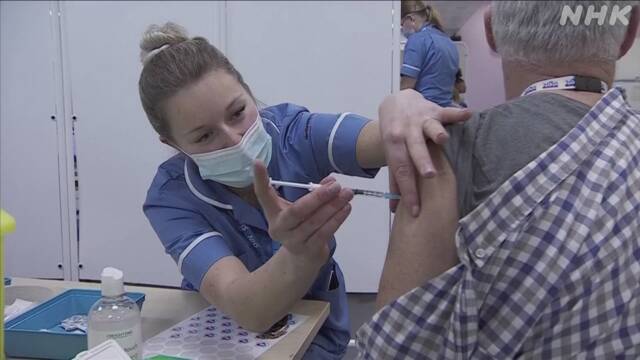In the United Kingdom, vaccination against the new coronavirus is being promoted with priority given to the elderly.
Already, nearly half of the population, more than 31 million people, have been vaccinated for the first time, and as the infection situation improves and strict restrictions on going out are gradually relaxed, the daily lives of the elderly are gradually returning.
In the United Kingdom, vaccination began in December last year with priority given to the elderly, and so far more than 31 million people, or about 47% of the population, have received the first vaccination.
In England, which accounts for the majority of the population, vaccinations are proceeding smoothly, with 95% of people over the age of 60 receiving the first vaccination.
Of the three vaccines currently inoculated in the United Kingdom, British health officials have analyzed data up to mid-February for vaccines developed by Pfizer and Biontech and those developed by AstraZeneca and the University of Oxford. did.
As a result, it is said that the effect of preventing elderly people over 80 years old from becoming severely ill and being hospitalized exceeds 80% 3 to 4 weeks after the first vaccination.
Analyzing data from people vaccinated by the end of last month, they said they were able to prevent the deaths of about 10,000 people over the age of 60.
According to statistics from the English health authorities, the number of daily inpatients aged 65 and over exceeded 700 in mid-January, but due to the effects of strict restrictions on going out, it took about 7 minutes in early March. It has decreased to 1 of.
In the United Kingdom, where more than 120,000 people have died from the virus, regulations such as strict restrictions on going out have often been introduced.
Elderly people who are especially at high risk of getting infected say that they "feel protected" by vaccination and that they "have become able to act with confidence without being afraid of the virus."
In the UK, the number of infected people has decreased significantly in recent months, and the effectiveness of the vaccine has been confirmed. Since last month, strict regulations have been gradually relaxed, and walks in towns and parks with family and friends. The behavior of the elderly is becoming more active, such as playing sports and enjoying sports.
On the other hand, the government is not overconfident in the effectiveness of the vaccine and is calling for thorough personal measures such as washing hands and keeping a distance from people.
Expectations for resuming overseas travel
Traveling abroad is becoming more of a concern among British people as vaccinations become more widespread.
Currently, it is still prohibited in principle, but some people make reservations in anticipation of resumption, and according to industry groups, there are many people in the generation who have advanced vaccination.
Steve Lewis, who lives in the south of England in his 70s, is one of them, and is planning a trip to Greece in June.
"The second vaccination is scheduled for April 29th. It's been two months since then, so I think it's enough to be effective," said Lewis.
However, many of the destination countries are not yet as vaccinated as the United Kingdom.
"It's safe to travel, so it's very important that vaccination spreads to travel destinations around the world, not just in the UK," said Sean Tipton, a spokeswoman for the British Travel Agents Association. , It is said that it will take time for many people to go on overseas trips as before the spread of the infection.
Deregulation gradually in London Elderly people who have begun to return to their daily lives
In addition to improving the infection situation, vaccination is proceeding smoothly, and London is undergoing gradual easing of strict regulations that have continued since late December last year.
Along with this, the appearance of elderly people walking around the city for shopping and walking in the park with family and friends has become more prominent.
A 73-year-old couple who were taking a walk in a park in central London said, "I feel a little better. I'm glad that the news reports that the infection has improved. I haven't seen him for about a month, and my sixth grandson was born yesterday, so I want to see him soon. "
Vaccinated seniors over the age of 60 enjoyed playing at a tennis club in London, which reopened about two weeks after deregulation.
A 71-year-old man said, "I was really disappointed that I couldn't play tennis here because of strict restrictions on going out. I suddenly couldn't do what I normally did." I feel like I'm being played. I can act with confidence. I'm looking forward to the second vaccination scheduled for this month, "he said with a cheerful expression.
In addition, an 83-year-old woman said, "I've always wanted to play tennis and get together. I feel protected by the vaccination, but I buy groceries by delivery and wear a mask. I'm wearing it. I want my daily life to come back little by little. "
Elderly people enjoyed a different time in a long time, such as sitting on a bench and chatting between plays.
Last year, a 73-year-old woman who was infected with the virus and had confirmed antibodies but was vaccinated at the recommendation of a doctor said, "I feel like I have twice the protection. I have traveled to Portugal every year for more than 20 years, so early. I want to go, "he said, saying his expectations for overseas sightseeing trips, which are currently prohibited.

